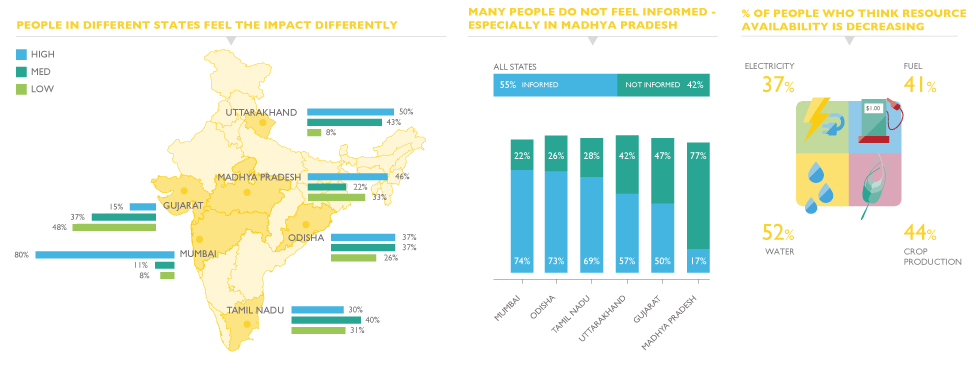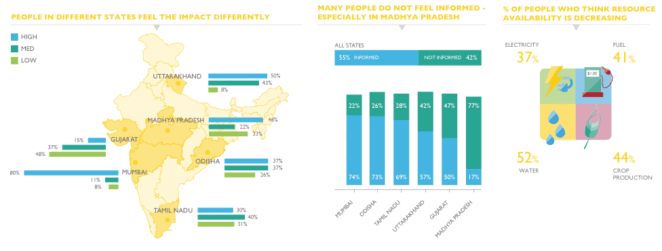Perceptions of Climate Change in India

The Climate Asia project
Climate Asia is the largest ever study of people’s experience of climate change in seven countries – Bangladesh, China, India, Indonesia, Nepal, Pakistan and Vietnam – involving the collection and analysis of survey data from over 33,500 people. This unique data provides information for governments, donors, the media, NGOs and everyone who wants to support people to adapt to the changing environment.
Country Infographic

Context
Shortage of water is the big concern for people. In all the states surveyed people noticed decreases in water availability and are worried about not having enough clean drinking water. These water shortages are leading to crops failing, increased expenses due to having to buy more fertilisers and more health concerns. The majority thought that water shortage was caused by changes in weather.
Across all the states that we surveyed – Gujarat, Madhya Pradesh, Odisha, Tamil Nadu, Uttarakhand and the city of Mumbai – people also felt that temperatures have increased and that rainfall had reduced and become more unpredictable.
While some people are taking action, many who are experiencing the impact of these climatic changes are not adapting their practices nor willing to act in the future. They feel that the government should support them more and that there is nothing they do as individuals that can resolve this problem. Their lack of willingness to respond contrasts with the neighbouring countries of Pakistan, Bangladesh and Nepal where people feel more responsibility to take action and think their actions will make a difference.
In India, people living in the cities and who have more financial resources are taking more action, as are those who feel they can make decisions as a community and feel more informed.
There are differences in how people are responding by state. For example, people in Madhya Pradesh are struggling; they are experiencing lack of water, have little confidence in the government and feel that they can’t make a difference and the government should support them more. In contrast, people in Odisha are adapting more; they have a high level of awareness of the issues and know how to respond. Here they are taking both small actions, such as making water safer to drink, and long-term actions such as using renewable energy or improving irrigation.
Communication
To engage India in climate change and increase willingness to respond, there is a need to communicate differently. One way of doing so is by framing the issue of climate around key issues such as water shortage and looking at the personal impacts such as reduced income and health concerns. This will help to build awareness of both immediate and future risks that people face in their everyday lives.
There is a role for the government to illustrate to the public which actions they can take as individuals or as part of a community and which actions the government are working on. Communication can help to encourage people to take action by fostering a spirit of responsibility. This includes giving people information on how they can take action, inspiring people by showing others like them being successful, and encouraging people to share examples of simple actions that help people lessen the impact of change.
For people who are not currently feeling any impact, communication can build awareness of how their lives may be affected in the future and what they can do now to help themselves and others.
People trust television more than any other source of information, including government. Communication should use television to reach audiences and then seek to enhance this with face-to-face communication where appropriate. There is also a role for partnerships between television, non-governmental organisations (NGOs) and government to increase trust in interventions and create new opportunities to bring the issue of climate change to life.
Findings
69% do not think it will make a difference if they take action.
46% have confidence in local government to take action compared to 24% in NGOs.
88% of people would like to respond to changes in climate and resources to make or save money.
77% would prefer receiving information through television and 44% prefer newspaper.
95% of people are discussing changes in weather and resources with family/friends.
52% report that water availability has decreased in last 10 years.
42% do not feel informed about how to respond to changes.
(0) Comments
There is no content